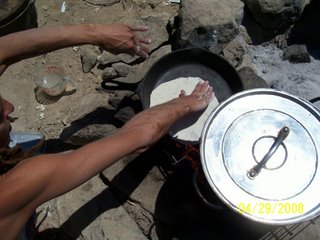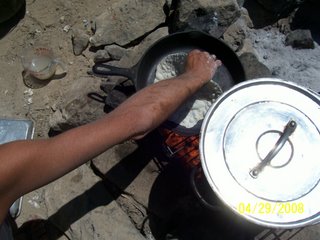What A Little Effort Can Do For Debt Reduction
 There are many, many things I love about my life here in the beautiful mesas of the Chihuahuan Desert. Among those are the contrasts, the juxtapositioning of old and new ways of living.
There are many, many things I love about my life here in the beautiful mesas of the Chihuahuan Desert. Among those are the contrasts, the juxtapositioning of old and new ways of living.While I make use of the remarkable technologies of today as I write this now, I spent some time this morning as the indigenous women of this region did for thousands of years -- making tortillas. And, while I was working, I was thinking about a couple things related to cooking at home -- far less expensive and far more healthy overall.
I could buy tortillas. They run about a dollar a
 dozen. In the photos (always clickable for a larger view), I am mixing up a batch of about 40 for less than a dollar... and, if I do say so myself, my home-made, fresh tortillas are far better than those mass produced in the factory and bagged up. Everyone here has said so, too.
dozen. In the photos (always clickable for a larger view), I am mixing up a batch of about 40 for less than a dollar... and, if I do say so myself, my home-made, fresh tortillas are far better than those mass produced in the factory and bagged up. Everyone here has said so, too.In the big pot next to my wanna-be comal -- I have no proper comal for tortilla making, so I make do with a well-seasoned iron skillet -- are about 5 pounds of pinto beans. I'm feeding 9
people with hearty appetites. I'll be smashing and
frying a good portion of those beans with some
spices for tacos tonight, which is why I made
 tortillas this morning. The rest of the beans will be used tomorrow by my sister to make her awesome chili.
tortillas this morning. The rest of the beans will be used tomorrow by my sister to make her awesome chili.The dried beans are pretty inexpensive, about 2 dollars for 4 pounds. Canned beans are easily double and often triple the price. It seems kind of silly to pay that when cooking dry beans is so easy. If I wanted to, I could buy canned refried beans for my tacos, though that would also be much more expensive, and I'd still have to add spices to make them palatable. Furthermore, they'd be less nutritious from the can, and probably have MSG and be high in sodium.
My point, over all, is that many people spend a lot of money on prepared foods, convenience foods, and drive-through foods, when by investing a little effort they could save a considerable amount on their food bill by cooking at home. Furthermore, most of those quick foods are price heavy and nutrition light. The benefits of eating fresh, whole foods are innumerable, but if we stick to the financial aspect for a moment, improved health leads to less money spent on costly health care.
There are many things in day-to-day life that are similar. For those looking to reduce debt and decrease spending (leaving more money for saving or more time for something other than working to pay the bills), learning to do basic repair tasks around the home and on the auto really isn't all that difficult. Being less dependent on others to meet your needs is a very good thing, particularly in today's economic climate.
I've been following the recent news about food shortages, skyrocketing prices, and the rationing of some food items throughout the world with a blend of fascination and horror. This is exactly the scenario that inspired me to remove my family from the city. I, geek that I am, have strange hobbies. Global economics is one of those hobbies and I've been watching trends for a few years now. To me, as well as to many financial experts, it looks like times are sure to be fiscally challenging in the near future and for a significant period of time thereafter. The financial markets are going to have to go through their spasms of correction and we're all going to have to go along for the ride.
During the Great Depression, while those in rural areas did experience severe poverty, they did have a significant advantage over those living in urban areas -- the ability to grow and hunt for their food. During World War II, the Victory Garden was an important supplement to households throughout the nation, including urban neighborhoods, as common, daily-use foods were rationed by the government. Looking at our situation today, it seems that learning to develop a bit of food self-sufficiency -- whether by cooking more, creating urban patio or fire escape gardens in containers, or larger suburban or rural gardens --is not just good economics in terms of a debt reduction plan or strategy for reducing overall expenses, but also simply good old-fashioned common sense.
Labels: budget, budgeting, debt, debt_elimination, debt_freedom, debt_reduction, economy, financial_prudence, frugal_living, overspending, saving, sharonsecor, sustainable_living, voluntary_simplicity
|
--> CLICK HERE TO VOTE IN THE DEBT POLL <--
|


